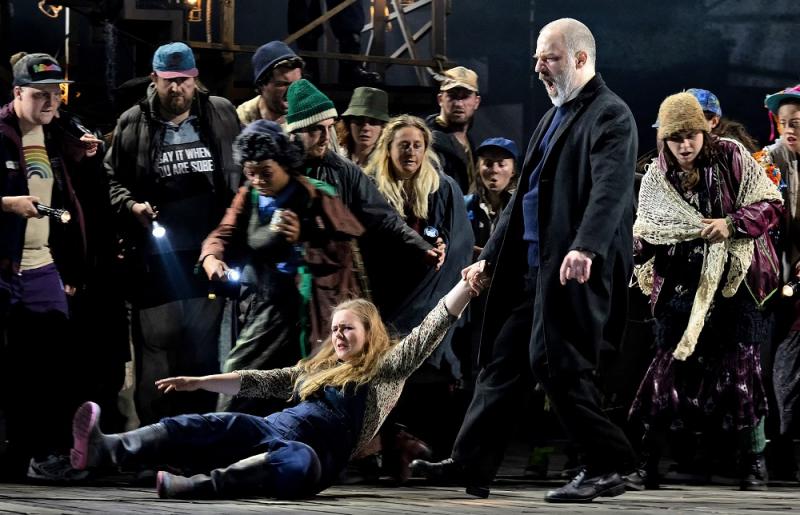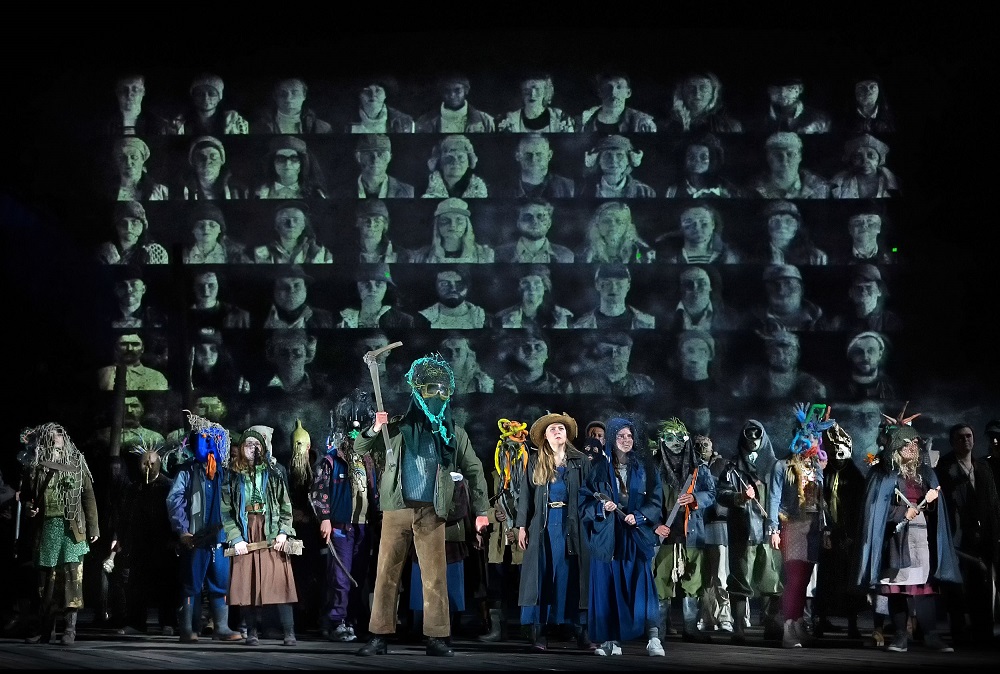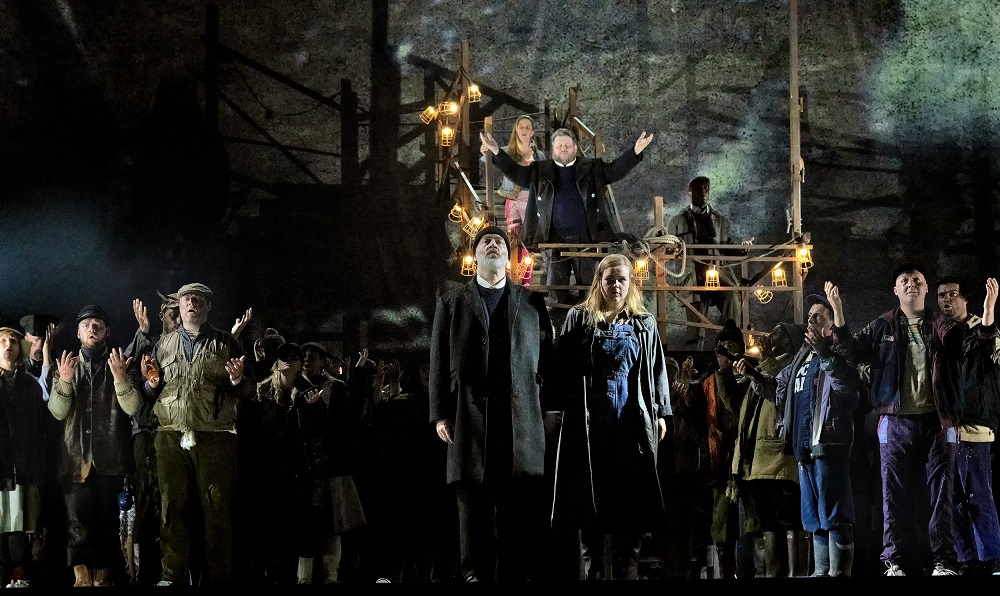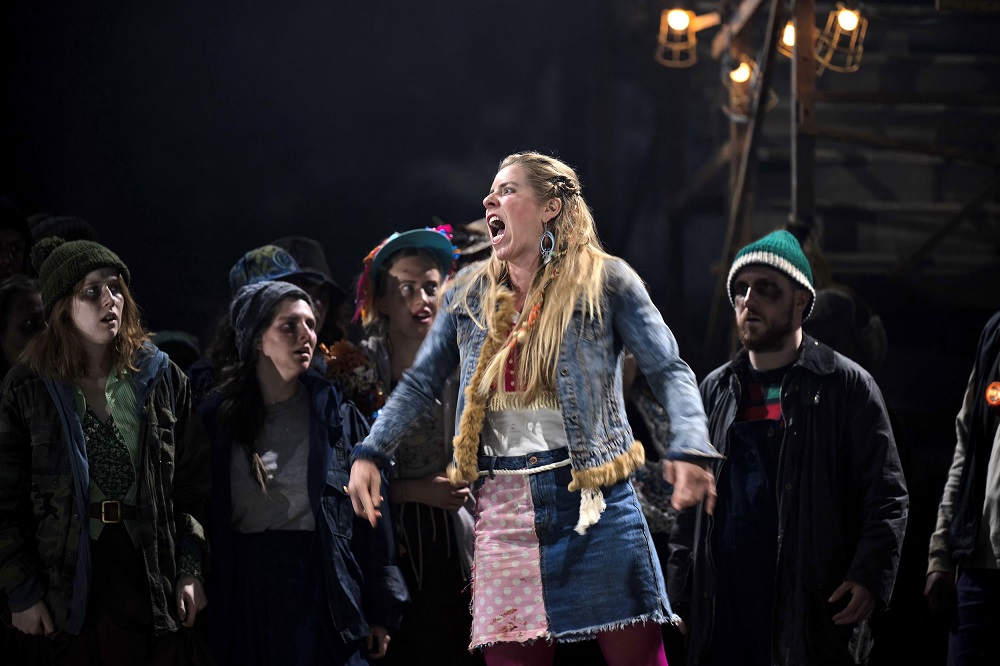The Wreckers, Glyndebourne review - no masterpiece, but vividly sung and played | reviews, news & interviews
The Wreckers, Glyndebourne review - no masterpiece, but vividly sung and played
The Wreckers, Glyndebourne review - no masterpiece, but vividly sung and played
Blowsy, intriguing grand opera by Ethel Smyth has full theatrical impact

Interesting for the history of music, but not for music? Passing acquaintance with Ethel Smyth’s The Wreckers, a grand opera by a woman at a time (the early 1900s) when circumstances made such a thing near-impossible, had suggested so.
It's big-hearted, energetic and massively flawed. The libretto, by a one-time lover of the composer, Henry Brewster, an American brought up in France who wrote it in that country’s language, is flatulent and sometimes risible. The basis – Smyth’s walking tour of Cornwall, where she learned of early Methodist communities who invoked God in their wrecking of ships, plunder of the goods and murder of the crews – yields a horrible portrait of a psychotic community as the frame for a familiar operatic tale of illicit lovers and jealous rivals.  Director Melly Still tries to go for contemporary in the look (designs by Ana Inés Jabares-Pita) and visual overload from the start, masking an overture which already reveals Smyth’s melodramatic intent. Four dancers representing, I guess, fateful spirits from the past wave and flounce around to not much effect. Act 2 looks a mess, with reams of dry ice; Act 3 fails to make a love-death anything but risible.
Director Melly Still tries to go for contemporary in the look (designs by Ana Inés Jabares-Pita) and visual overload from the start, masking an overture which already reveals Smyth’s melodramatic intent. Four dancers representing, I guess, fateful spirits from the past wave and flounce around to not much effect. Act 2 looks a mess, with reams of dry ice; Act 3 fails to make a love-death anything but risible.
Then you take into account the tremendous commitment of all involved, and you feel a bit guilty for sniggering at excess. Though it takes a long time in getting to the point of who’s lighting the fires to warn ships away from the murderous pack, the drama does deliver, with a central love-duet that does all the right things while not being especially memorable and a final “secret trial” in a cave which pulls one lurid stop after another out with undeniable theatricality (pictured below). The fact is that Ticciati believes in every phrase, and that Glyndebourne has assembled a magnificent cast and the usual chorus of young future stars relishing its presence as a pre-Grimesian Borough, delivering the hate and the fury as if they were up to Britten’s level (they aren’t, and in any case we’re talking about 1906 rather than 1945, but in the moment manner triumphs over matter).  Smyth’s ingestion of what was going on in opera at the time is impressive, even if the tritone, that interval of the augemented fourth known since medieval days as the “devil in music”, and the “supernatural” whole-tone scale incorporating it, are not often used with the subtlety of Debussy, whose Pelléas et Mélisande must have been an influence on the more intimate music, of which there is plenty in between the bluster. But there is an attractive French manner in some of the short set-pieces sewn into the fabric, not least the music for Avis, jealous of the handsome Marc’s love for Another, which is Carmenesque at times; soprano Lauren Fagan (pictured below) delivers them all with commitment and spot-on top notes, giving us into the bargain the only characterisation which really has any individuality.
Smyth’s ingestion of what was going on in opera at the time is impressive, even if the tritone, that interval of the augemented fourth known since medieval days as the “devil in music”, and the “supernatural” whole-tone scale incorporating it, are not often used with the subtlety of Debussy, whose Pelléas et Mélisande must have been an influence on the more intimate music, of which there is plenty in between the bluster. But there is an attractive French manner in some of the short set-pieces sewn into the fabric, not least the music for Avis, jealous of the handsome Marc’s love for Another, which is Carmenesque at times; soprano Lauren Fagan (pictured below) delivers them all with commitment and spot-on top notes, giving us into the bargain the only characterisation which really has any individuality.
Karis Tucker as outsider Thurza, married to the vicious old preacher Pasko, has to deal with her cipherishness, a problem also for tenor Rodrigo Poirtas Garulo’s Marc, the freedom-fighter who lights the beacons; their vocal assurance just about carries the big duet. But they do properly flame in the series of Act Three accusations and revelations. Philip Horst is unflinchingly strong of voice as Pasko: his big Act One number is musically memorable, if led by the orchestra, while the solo in the next act just makes one feel “get on with it” after the lovers have fled the scene. James Rutherford’s Laurent comes into his own in the climactic trial. Marta Fontanals-Simmons as the boy Jacquet has attractive scherzo-like music in her scene with Avis in Act Two.  That follows on from the most haunting stretch of the score, a preludial sea picture with splashes of harp in which Smyth touches on marine magic at a deeper level than in most of the rest of the opera; good to know that it was extracted as a concert-piece, It’s ravishingly phrased by the London Philharmonic Orchestra under Ticciati, who nurtures everything as if it were first-class music and has the surest of dramatic instincts. All that typical Glyndebourne preparation time has paid off and yielded a result which is never dull, however blatant at times. Kudos to all involved, and what a great idea to light fire-beacons all round the grounds to make us wonder and slightly fearful afterwards - let's hope the Christies are safe from the posse of neighbours formerly on the warpath about the wind turbine on the hill.
That follows on from the most haunting stretch of the score, a preludial sea picture with splashes of harp in which Smyth touches on marine magic at a deeper level than in most of the rest of the opera; good to know that it was extracted as a concert-piece, It’s ravishingly phrased by the London Philharmonic Orchestra under Ticciati, who nurtures everything as if it were first-class music and has the surest of dramatic instincts. All that typical Glyndebourne preparation time has paid off and yielded a result which is never dull, however blatant at times. Kudos to all involved, and what a great idea to light fire-beacons all round the grounds to make us wonder and slightly fearful afterwards - let's hope the Christies are safe from the posse of neighbours formerly on the warpath about the wind turbine on the hill.
rating
Explore topics
Share this article
Add comment
The future of Arts Journalism
You can stop theartsdesk.com closing!
We urgently need financing to survive. Our fundraising drive has thus far raised £49,000 but we need to reach £100,000 or we will be forced to close. Please contribute here: https://gofund.me/c3f6033d
And if you can forward this information to anyone who might assist, we’d be grateful.

Subscribe to theartsdesk.com
Thank you for continuing to read our work on theartsdesk.com. For unlimited access to every article in its entirety, including our archive of more than 15,000 pieces, we're asking for £5 per month or £40 per year. We feel it's a very good deal, and hope you do too.
To take a subscription now simply click here.
And if you're looking for that extra gift for a friend or family member, why not treat them to a theartsdesk.com gift subscription?
more Opera
 The Makropulos Case, Royal Opera - pointless feminist complications
Katie Mitchell sucks the strangeness from Janáček’s clash of legalese and eternal life
The Makropulos Case, Royal Opera - pointless feminist complications
Katie Mitchell sucks the strangeness from Janáček’s clash of legalese and eternal life
 First Person: Kerem Hasan on the transformative experience of conducting Jake Heggie's 'Dead Man Walking'
English National Opera's production of a 21st century milestone has been a tough journey
First Person: Kerem Hasan on the transformative experience of conducting Jake Heggie's 'Dead Man Walking'
English National Opera's production of a 21st century milestone has been a tough journey
 Madama Butterfly, Irish National Opera review - visual and vocal wings, earthbound soul
Celine Byrne sings gorgeously but doesn’t round out a great operatic character study
Madama Butterfly, Irish National Opera review - visual and vocal wings, earthbound soul
Celine Byrne sings gorgeously but doesn’t round out a great operatic character study
 theartsdesk at Wexford Festival Opera 2025 - two strong productions, mostly fine casting, and a star is born
Four operas and an outstanding lunchtime recital in two days
theartsdesk at Wexford Festival Opera 2025 - two strong productions, mostly fine casting, and a star is born
Four operas and an outstanding lunchtime recital in two days
 The Railway Children, Glyndebourne review - right train, wrong station
Talent-loaded Mark-Anthony Turnage opera excursion heads down a mistaken track
The Railway Children, Glyndebourne review - right train, wrong station
Talent-loaded Mark-Anthony Turnage opera excursion heads down a mistaken track
 La bohème, Opera North review - still young at 32
Love and separation, ecstasy and heartbreak, in masterfully updated Puccini
La bohème, Opera North review - still young at 32
Love and separation, ecstasy and heartbreak, in masterfully updated Puccini
 Albert Herring, English National Opera review - a great comedy with depths fully realised
Britten’s delight was never made for the Coliseum, but it works on its first outing there
Albert Herring, English National Opera review - a great comedy with depths fully realised
Britten’s delight was never made for the Coliseum, but it works on its first outing there
 Carmen, English National Opera review - not quite dangerous
Hopes for Niamh O’Sullivan only partly fulfilled, though much good singing throughout
Carmen, English National Opera review - not quite dangerous
Hopes for Niamh O’Sullivan only partly fulfilled, though much good singing throughout
 Giustino, Linbury Theatre review - a stylish account of a slight opera
Gods, mortals and monsters do battle in Handel's charming drama
Giustino, Linbury Theatre review - a stylish account of a slight opera
Gods, mortals and monsters do battle in Handel's charming drama
 Susanna, Opera North review - hybrid staging of a Handel oratorio
Dance and signing complement outstanding singing in a story of virtue rewarded
Susanna, Opera North review - hybrid staging of a Handel oratorio
Dance and signing complement outstanding singing in a story of virtue rewarded
 Ariodante, Opéra Garnier, Paris review - a blast of Baroque beauty
A near-perfect night at the opera
Ariodante, Opéra Garnier, Paris review - a blast of Baroque beauty
A near-perfect night at the opera
 Cinderella/La Cenerentola, English National Opera review - the truth behind the tinsel
Appealing performances cut through hyperactive stagecraft
Cinderella/La Cenerentola, English National Opera review - the truth behind the tinsel
Appealing performances cut through hyperactive stagecraft

Comments
Rather a harsh review. I